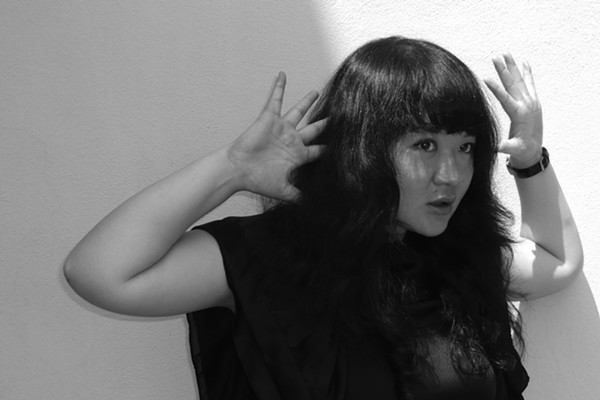She’s barely unpacked from a trip to China and is soon off to Pakistan. But next week, composer Du Yun comes back to Oberlin College to watch the final performances of her opera Angel’s Bone, which won the Pulitzer Prize for music last year. She says she’s delighted the work, crafted with librettist Royce Vavrek, is getting the college treatment.
“I remember when I was at Oberlin, you felt like you could do anything,” says Du Yun, a 2001 graduate, from her home in New York. “At least that’s what Oberlin taught me — fearlessness. Like, not having a bar of what I can not do, that’s really exciting. Later, when you’re a professional, you’re told what you should not do. But when you’re in college you want to do anything. And you work harder.”
A collaboration with Cleveland Opera Theater, this is only the second time the show is being performed in its final form. Du Yun, who visited the opera cast late last year during rehearsals, says she’s not as worried about total perfection with this performance, but has every faith in the students and director Christopher Mirto’s abilities.
However, this is a modern opera, which is to say that it’s nothing as straightforward as Puccini or Mozart. Instead, the score calls on singers to not only employ traditional vocal techniques, but also punk rock yells and snarls. The music is luscious and eerily soft, then at once replete with jarring electronic sounds. Its strange stutters and stops constantly create an aura of unease.
The subject matter isn’t any easier. The work is a bold statement on the horrors of human trafficking in this country. In the show, a couple finds a pair of fallen angels in their garden. At first they help the beings regain their strength, only to then prune their feathers and exploit them for personal gain. The mix of magical realism is naturally over the top, but deeply disturbing.
Yet Du Yun, who is originally from China, says her goal isn’t to make some sort of political statement.
“I don’t think political art is art, but I do think a work of art can engage in political topics.” she says. “I never thought, ‘I’m going to win some prize here.’ Instead, I wanted to have a voice. For three hours, when people come to my concert, they’re not doing anything but spending time with me, and I want to share something. That’s an invaluable thing and I’m not going to waste it.”
Altogether it took nearly seven years and many stages to make Angel’s Bone a reality. Du Yun says she learned something about the story and the harrowing subject matter with each iteration.
“I had to do a lot of research,” she says. “It’s so sad. So, so sad. But never was I thinking about writing a piece for shock value. I always say real life is the most shocking.”
And that’s why she says opera will survive in today’s world. It shows humanity at its most intimate and most dramatic, in a way that a movie can’t, she says. She sees hope in the modern opera scenes in New York and Los Angeles, with their smaller (cheaper) productions, which allow audiences to commune with the music in an intimate way.
“I don’t think opera is dying, I think it’s evolving,” she says. “I’m looking forward to the day when I don’t have that question.”
Angel’s Bone
Through Feb. 7
Cat in the Cream Coffeehouse, Hales Annex 180 West Lorain Street, Oberlin
Tickets are Free
Note: Tickets are sold out, but people can arrive 30 minutes prior to showtime to get on the waitlist


